Nick Merrill
Principal Investigator

The digital world has never floated freely, untethered from political and geographical boundaries, nor has it ever been fully under the political control of a single country. But who specifically controls it? And when or why might that control, broadly speaking, matter?
Since 2019, the Internet Atlas Initiative has leveraged internet measurements to understand how geopolitics shapes the internet—and how the internet shapes geopolitics.
In 2019, the Center for Long-Term Cybersecurity set out to develop more global and nuanced metrics to track internet fragmentation—what it was, where it was happening, and the direction and velocity of change over time. Five years later, our scope of research and our team of researchers has expanded.
Today, our research centers around one central question. The internet has only existed during the so-called Pax Americana, a time of relative geopolitical stability. What does a return to broad, geopolitical competition mean for the internet’s stability?
Our research speaks to this question by measuring the internet at various layers of its technical “stack,” from the physical submarine cables that connect Taiwan to the world to the abstract, software-defined content distribution networks that deliver most content on the internet. By collecting reproducible, publicly verifiable measurements, we aim to identify risks to the internet’s long-term stability. We then aim to convene discussions on risk mitigation strategies with relevant internet governance stakeholders.
We empower government, industry, and civil society stakeholders worldwide with data to (1) inform policy aimed at making the internet more stable, secure, and equitable, (2) evaluate those policies’ long-term impacts, and (3) demonstrate and articulate those impacts to the public.
To achieve this vision, we collaborate with an international, interdisciplinary network of scholars, policymakers, and industry leaders, producing open-access, reproducible research on the internet’s structure and related security considerations. With that research, we support dialogue across the public sector, the private sector, and civil society, both domestically and internationally.
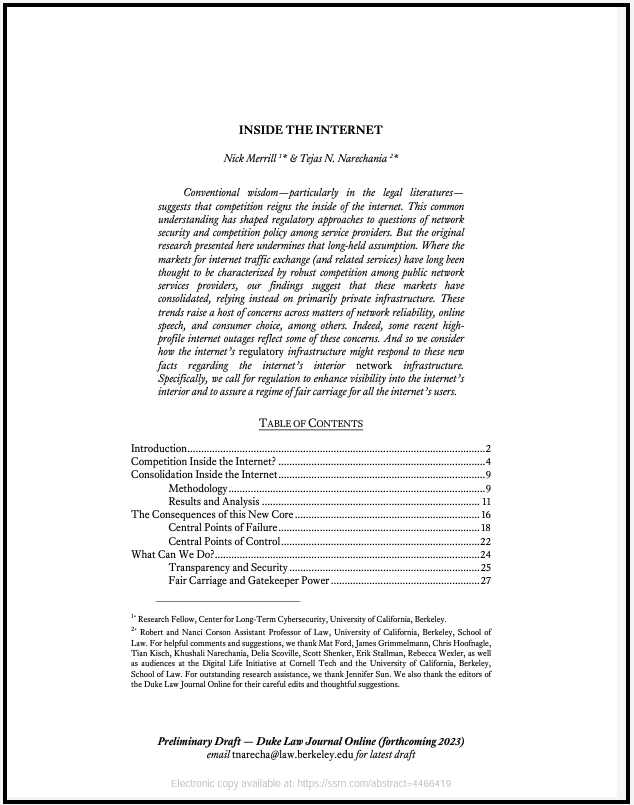
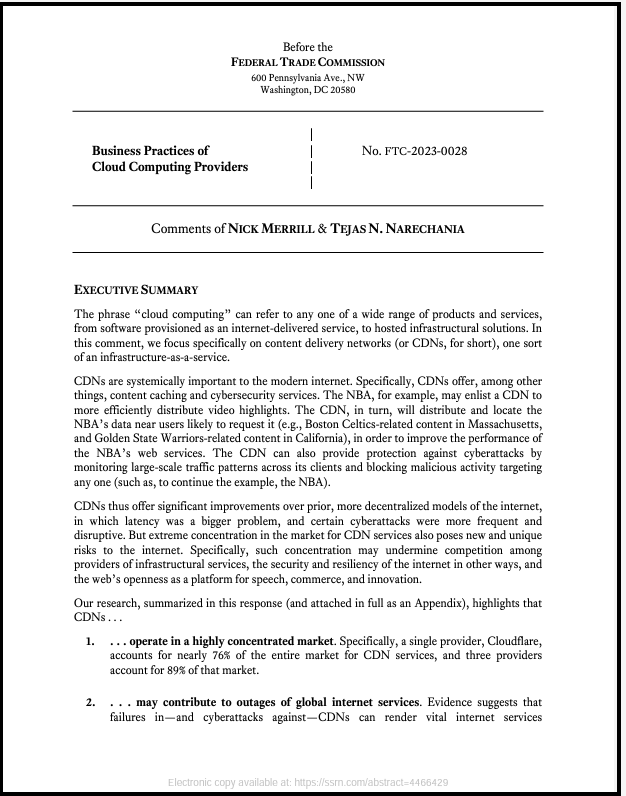
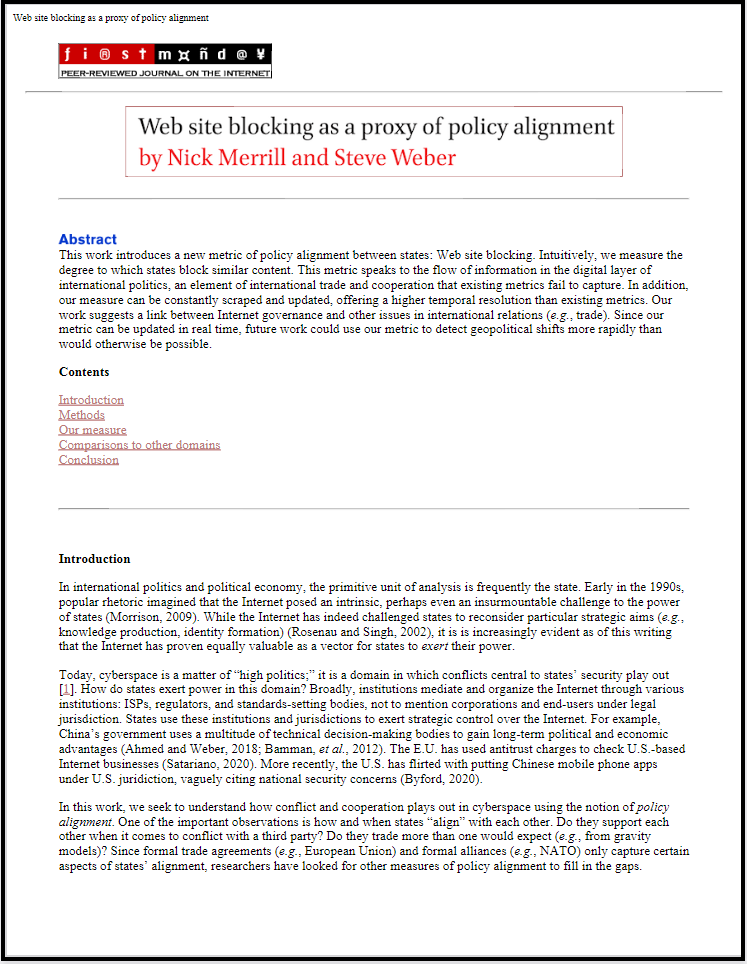
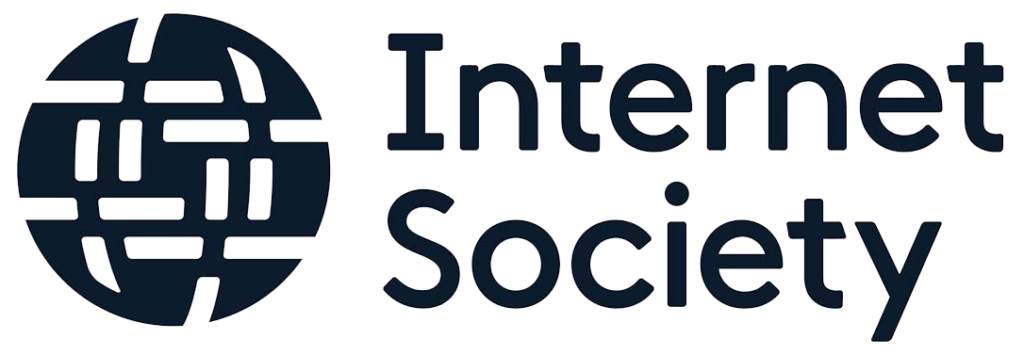
The Internet Society’s Pulse Dashboard collects measurements about the overall health of the internet. One focus area is decentralization. The Internet relies on a decentralized architecture, in which control of core Internet services is distributed across a ‘network of networks‘. This ensures a more resilient network and avoids single points of failure or control.
The Internet Atlas Initiative contributes realtime data on the degree to which core internet services are centralized in the hands of particular corporations, and in which legal jurisdictions (e.g., countries) those corporations are headquartered. These data paint a worrying picture: the internet’s core infrastructure is growing increasingly centralized among a small handful of U.S.-based corporations.
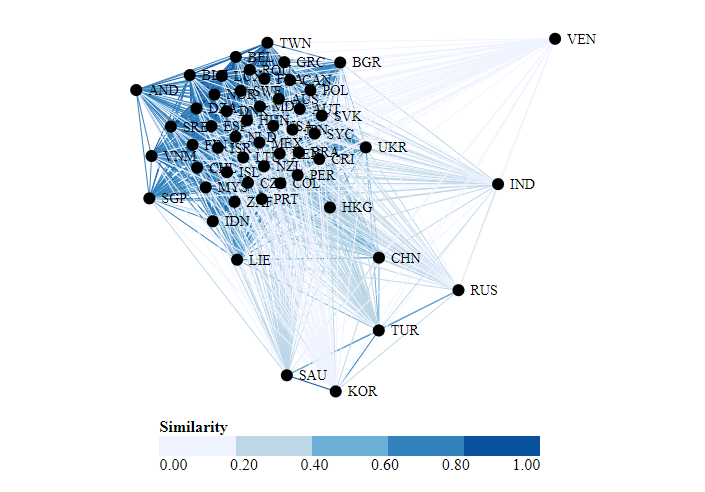
In Merrill & Weber (2020), we set out to understand how conflict and cooperation plays out in cyberspace using the notion of policy alignment. Since a country’s policy stance on any given set of issues is complex to the point of being unobservable in a measurable way, researchers use proxies of policy stances. We used web site blocking as a proxy of policy alignment. Specifically, we collected data on which web sites are blocked in (nearly) every country in the world. We then compared blocking behaviors across all country pairs.
This tool visualizes similarities in blocking patterns across all of the world’s countries. Our findings reveal one large cluster dominates internet policy by our metric’s measure: most countries block little content, if any. A smaller cluster—Vietnam, Serbia, Singapore, Belize, Taiwan, Bulgaria, Ukraine, and Hong Kong—all surround the the perimeter of this “main” Internet, retaining moderately high similarities with countries in the center. A second, smaller cluster—Korea, Russia, India, Saudia Arabia, and Turkey—all block similar content to one another. China and Venezeula each have unique patterns of web site blocking. Interstingly, as we discuss in our paper, this policy alignment metric correlates to other facets of political relations, including trade, millitary reliances, and measures of personal and press freedom.

